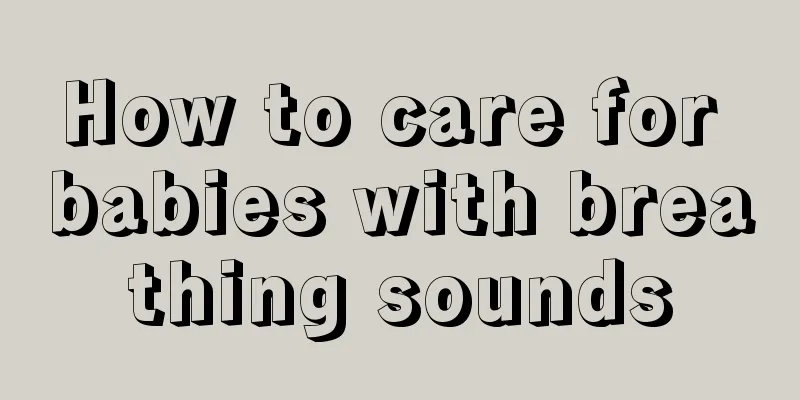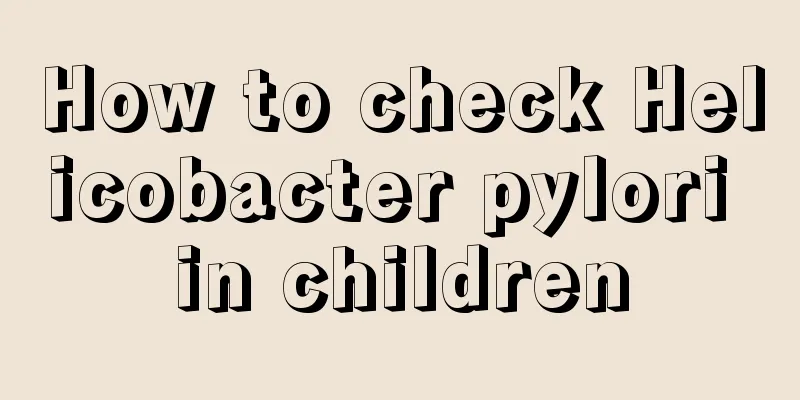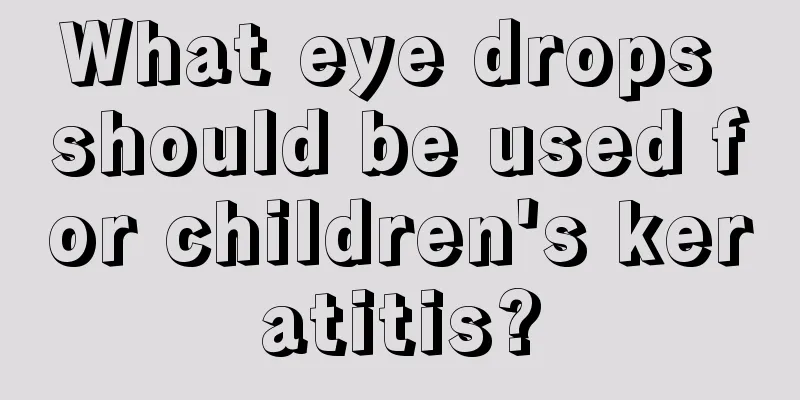How to care for babies with breathing sounds

|
In fact, for some people who have just become parents, any change or abnormality in their children will make them feel very nervous, even if the baby makes noise when breathing. Let us now learn about the care methods for babies with breathing sounds. Care methods: Preventing infection The number of people in the neonatal bedroom should be reduced as much as possible, and visitors should be refused or reduced, especially patients should not be allowed to enter the neonatal bedroom. The indoor air should be kept fresh, and windows should be opened regularly for ventilation while ensuring the room temperature. Wash your hands carefully when touching and caring for newborns. Pay attention to keeping your baby's skin clean. Wash the buttocks after defecation. Bath your baby regularly, paying special attention to the cleanliness and dryness of the skin in the armpits, thigh roots, elbows and thigh folds. The umbilicus is an important gateway for bacteria to invade the newborn's body and must be kept clean. Before the umbilical cord falls off, wipe it every day with a sterilized cotton swab dipped in 75% alcohol, and avoid using various powders. Then cover it with sterile gauze and seal it with adhesive paste. Always pay attention to prevent urine or feces from wetting the umbilical cord and the gauze covering it. If the navel is wetted by urine, it must be disinfected and the dressing changed immediately. The umbilical cord usually falls off in about a week. After it falls off, it is no longer covered with gauze, but the area still needs to be kept dry and clean. Maintain body temperature Newborns have poor adaptability to changes in external temperature and are prone to illness if they are too cold or too hot. The room temperature for newborns should be kept between 22-24 degrees Celsius, and that for premature babies should be kept between 24-26 degrees Celsius. The temperature difference between day and night should not be too large. In addition to appropriate room temperature, you should also pay attention to adding or removing clothes and bedding, and observe whether the room temperature and clothes and bedding are appropriate. The best indicator is to observe the body temperature of the newborn. It is ideal if it can be kept between 36-37 degrees Celsius (armpit). If the newborn's face is red, he is sweating, and his body temperature exceeds 37.5 degrees Celsius, it means that the room temperature is too high or the baby is over-warmed, and timely measures should be taken. In addition to the ambient temperature, newborns also require appropriate humidity. In winter and spring, the living rooms are generally too dry, so the floor should be wiped frequently with a wet cloth, and a basin of water should be placed on the heater or an open kettle of boiling water on the stove. It would be even better if an air humidifier could be used. Breastfeeding Mothers can start breastfeeding 4-8 hours after giving birth. Early breastfeeding is not only beneficial to the nutrition of the newborn, but also promotes the secretion of mother's milk. If breast milk is insufficient in the first two days, sugar water can be used to supplement it. Generally, sugar water should be fed after breast milk, and cow's milk or sugar water should not be used to replace breast milk easily. Breastfeeding should be encouraged for newborns, especially colostrum, the first breastfeeding after birth, which contains a variety of antibodies and must not be discarded. Newborns can be fed at a scheduled time, that is, every 3 hours; or they can be fed irregularly, that is, whenever the newborn wants to eat. This is more in line with the physiological needs of the newborn. Infant formula can only be used for feeding when there is really no breast milk. Strict medication After various drugs enter the body, they generally need to be detoxified by the liver and excreted through the kidneys. Newborns have poor liver and kidney functions, and it is extremely difficult to use medication. Therefore, they must never take medication on their own. They must be taken under the guidance of a pediatrician and strictly follow the prescribed dosage and course of treatment, otherwise adverse consequences are likely to occur. The above article has introduced in detail some care methods for babies with breathing sounds. I believe everyone has a relatively preliminary understanding. So if such a situation really occurs in life, if you are worried, you can go to the hospital for a check-up. |
<<: Treatment for baby's throat noise
>>: Causes of swollen eyes in babies
Recommend
What should I do if my baby can't sleep well after confinement?
Babies are the apple of their parents’ eyes. If a...
What are the symptoms of acute pharyngitis in children?
Acute pharyngitis is one of the most common disea...
What to do if children have toothache?
There are many reasons for swollen and painful gu...
Can children of short parents grow taller?
Many parents hope that their children's heigh...
How to prevent children from catching colds
For adults, colds are not a very serious disease,...
What to do if your child is particularly naughty
Children can often be very naughty because childr...
What should I do if my baby's fontanelle is closed?
The baby's body is very fragile, so once ther...
Can a one-year-old baby eat vinegar?
One-year-old babies can start eating some complem...
What to do if your child catches a cold and has a fever
Children catching cold and having fever is an ine...
What to do if your child's face is bruised
Children are active by nature and may bump into t...
Can a newborn baby's belly button touch water?
Generally speaking, a newborn baby has an umbilic...
Nursing knowledge of pediatric fractures
Children are naturally curious and like to move a...
Tips for treating fishbone stuck in children's throats
When an adult is choked by a fish bone, it is a v...
Why does the child's ears run?
Under normal circumstances, the inside of our ear...
How to make nutritious porridge for babies
In life, many mothers will feed their babies nutr...









